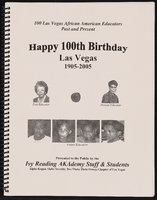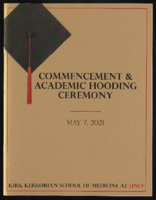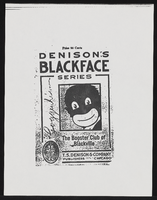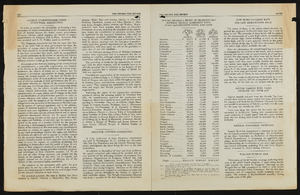Search the Special Collections and Archives Portal
Search Results
Sandstone Ranch Collection
Identifier
Abstract
The Sandstone Ranch Collection is comprised of bank statements, letters, correspondence, and photographs relating to the Wilson family from 1907 to 1941. The collection includes information about the financial aspect of the Wilson Ranch, later renamed the Sandstone Ranch, located outside of Las Vegas, Nevada. The collection also includes information about the personal lives of those working on the including contracts about grazing cattle, selling cattle, and appropriation of water.
Archival Collection
UNLV Libraries Collection on the Las Vegas Paiute Tribe
Identifier
Abstract
The UNLV Libraries Collection on the Las Vegas Paiute Tribe (approximately 1974-1990) contain oral history transcripts of Paiute community members from approximately 1974 to 1977 and reproductions of Bureau of Indian Affairs correspondence, legal documents, annual reports, and census information regarding the area formerly known as the Las Vegas Indian Colony located in Las Vegas, Nevada. The documents contain information about the original transfer of property ownership from Helen J. Stewart to the United States, who acted on behalf of the Paiute people in 1911, the establishment of the original site location, and annual reports which include a narrative about the community, census information, and health reports of the population living in the area. The collection contains no original documents.
Archival Collection
Claudine Williams Papers
Identifier
Abstract
The Claudine Williams Papers (1956-2009) contain awards, contracts, personal and business correspondence, newspaper clippings, and photographs pertaining to Las Vegas, Nevada businesswoman and philanthropist, Claudine Williams. The collection also includes extensive information on her hotel and gaming properties, including the Silver Slipper Gambling Hall, Holiday Casino, and Harrah's Hotel and Casino, as well as her honorary doctoral degree, medals, and audiovisual materials of interviews, news reports, and events.
Archival Collection

"100 Las Vegas African American Educators Past and Present" booklet
Date
Archival Collection
Description
From the Alpha Kappa Alpha Sorority, Incorporated, Theta Theta Omega Chapter Records (MS-01014) -- Ivy Leaf magazines and event souvenir programs file. Full title of booklet: "100 Las Vegas African American Educators Past and Present. Happy 100th Birthday Las Vegas, 1905-2005. Presented to the Public by the Ivy Reading AKAdemy Staff & Students, Alpha Kappa Alpha Sorority, Inc./Theta Theta Omega Chapter of Las Vegas."
Text

Kirk Kerkorian School of Medicine at UNLV 1st Commencement and Academic Hooding Ceremony
Date
Archival Collection
Description
Commencement program from University of Nevada, Las Vegas Commencement Programs and Graduation Lists (UA-00115).
Text

Nevada Southern University law program: reports and correspondence
Date
Archival Collection
Description
Folder contains memorandums, correspondence related to the law program at Nevada Southern University (later UNLV). It includes a report on the NSU law program (fall term 1967-1968), a report of the Association of American Law Schools Committee on Guidelines for New Law Schools (1966), and a report of Dean Willard H. Pedrick, Arizona State University College of Law (1967). From the University of Nevada, Las Vegas William S. Boyd School of Law Records (UA-00048).
Text

Angela Castro oral history interview: transcript
Date
Archival Collection
Description
Oral history interview with Angela Castro conducted by Stefani Evans, Cecilia Winchell, Kristel Peralta, Vanessa Concepcion, and Ayrton Yamaguchi on November 05, 2020 for the Reflections: The Las Vegas Asian American and Pacific Islander Oral History Project. Castro begins the interview by talking about her early life, childhood, what Guam was like, and the history of her parents and grandparents. She describes the difference in public and private education in Guam and compares it to the United States. She explains the reason why she moved to Las Vegas, Nevada in 1998 and attended the University of Nevada, Las Vegas for public relations. Castro then talks about the differences between older and newer generations, the political atmosphere in Guam, and the differences between the United States and Guam in politics. She also talks about the discrimination she has experienced throughout her life and diversity in the workplace. Lastly, she describes her culture and traditions during holidays, the struggles with an absence of culture within her family, and her personal religious beliefs.
Text

Depictions of Black people in various media and advertisements (including offensive caricatures, racist slogans and names, and non-Black people in Blackface)
Date
Archival Collection
Description
Folder from the Roosevelt Fitzgerald Professional Papers (MS-01082) -- Personal and professional papers file.
Mixed Content

Amber Diskin oral history interview: transcript
Date
Archival Collection
Description
Oral history interview with Amber Diskin conducted by Barbara Tabach on January 5, 2018 for the Remembering 1 October Oral History Project. In this interview, Amber Diskin discusses her experience at the Route 91 Harvest music festival during the October 1, 2017 mass shooting in Las Vegas, Nevada. Diskin talks about finding her way home after escaping the crowds and letting her family and friends know she was not hurt. She speaks of the aftermath of the shooting, including how her children were affected, the post-traumatic stress disorder she developed, and how the shooting has affected her love of concerts. As a native Nevadan, she shares her views of Las Vegas and how her sense of community deepened after this event. Diskin ends the interview by discussing her appreciation for the first responders and the gift baskets she helped distribute to hospitals, police stations, and the fire department.
Text

